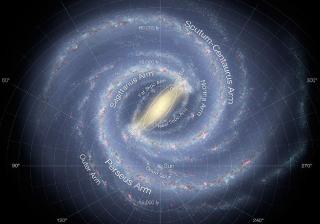Bibcode
Yaz Gökçe, E.; Karaali, S.; Duran, Ş.; Bilir, S.; Yalçınkaya, A.; Ak, S.; Ak, T.; López-Corredoira, M.; Cabrera-Lavers, A.
Bibliographical reference
Publications of the Astronomical Society of Australia, Volume 32, id.e012 9 pp.
Advertised on:
4
2015
Citations
5
Refereed citations
5
Description
We estimated the scale-length of the thin disc with the J and W1
magnitudes of the most probable red clump stars in the Galactic plane, -
0°.5 ⩽ b ⩽ +0°.5, in 19 equal sized fields with
consecutive Galactic longitudes which cover the interval 90° ⩽ l
⩽ 270°. Our results are constrained with respect to the solar
space density (D* = 5.95), which indicates that the radial variation of
the density is lower for higher Galactocentric distances. The
scale-length of the thin disc is 2 kpc for the fields in the Galactic
anticentre direction or close to this direction, while it decreases
continuously in the second and third quadrants reaching to a lower limit
of h = 1.6 kpc at the Galactic longitudes l = 90° and l = 270°.
The distribution of the scale-length in 19 fields is consistent with the
predictions from the Galaxia model and its variation with longitude is
probably due to the inhomogeneity structure of the disc caused by the
accreted material or other features such as warp and flare.
Related projects

Morphology and dynamics of the Milky Way
This project consists of two parts, each differentiated but both complementary: morphology and dynamics. Detailed study of the morphology of the Milky Way pretends to provide a data base for the stellar distribution in the most remote and heavily obscured regions of our Galaxy, through the development of semiempirical models based on the
Martín
López Corredoira